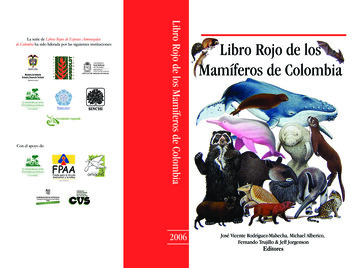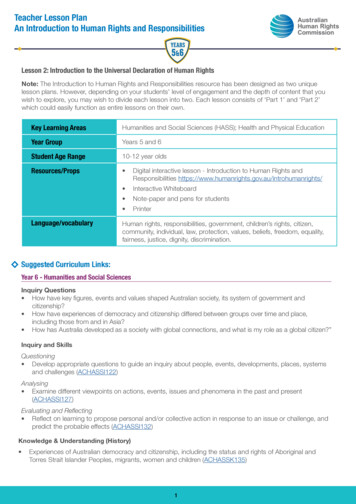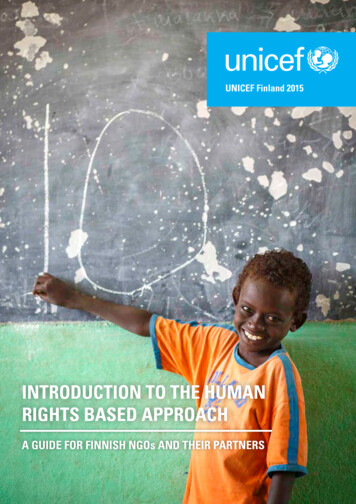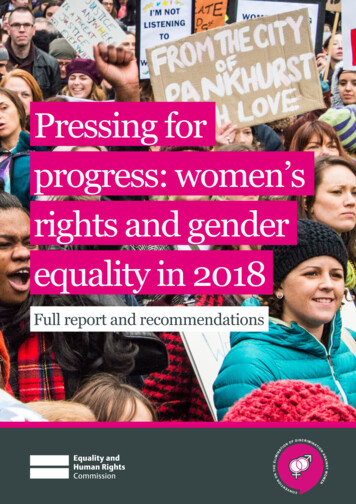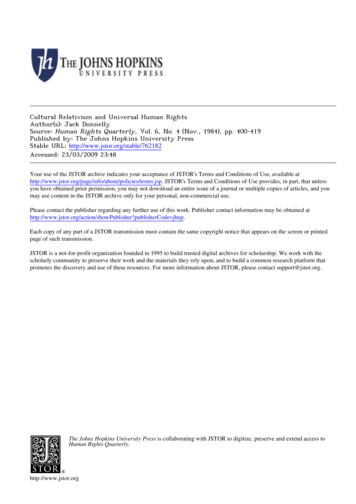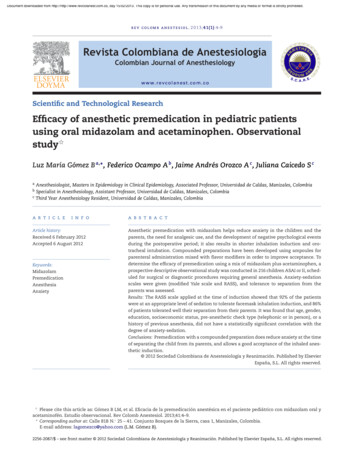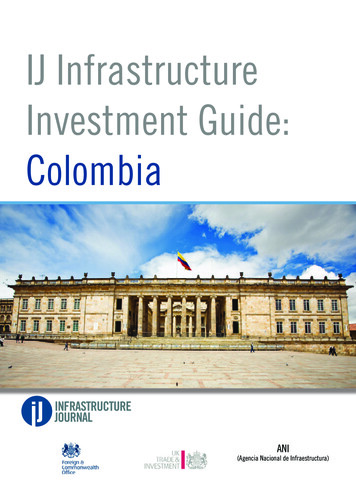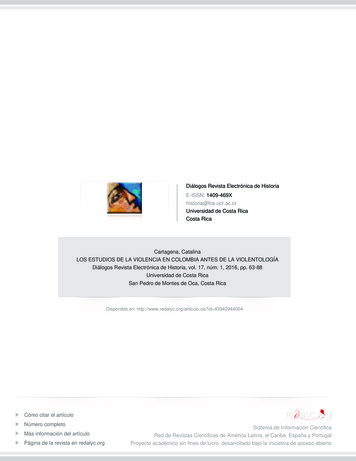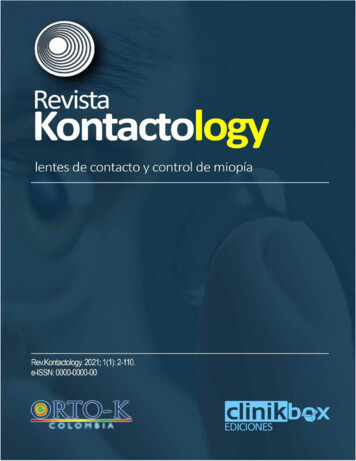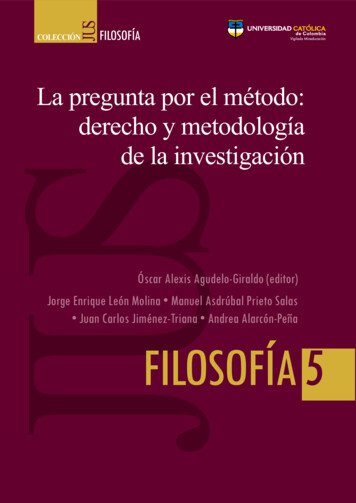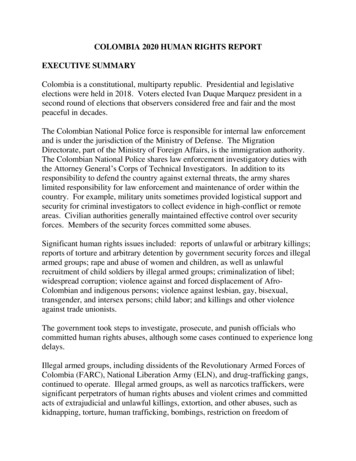
Transcription
COLOMBIA 2020 HUMAN RIGHTS REPORTEXECUTIVE SUMMARYColombia is a constitutional, multiparty republic. Presidential and legislativeelections were held in 2018. Voters elected Ivan Duque Marquez president in asecond round of elections that observers considered free and fair and the mostpeaceful in decades.The Colombian National Police force is responsible for internal law enforcementand is under the jurisdiction of the Ministry of Defense. The MigrationDirectorate, part of the Ministry of Foreign Affairs, is the immigration authority.The Colombian National Police shares law enforcement investigatory duties withthe Attorney General’s Corps of Technical Investigators. In addition to itsresponsibility to defend the country against external threats, the army shareslimited responsibility for law enforcement and maintenance of order within thecountry. For example, military units sometimes provided logistical support andsecurity for criminal investigators to collect evidence in high-conflict or remoteareas. Civilian authorities generally maintained effective control over securityforces. Members of the security forces committed some abuses.Significant human rights issues included: reports of unlawful or arbitrary killings;reports of torture and arbitrary detention by government security forces and illegalarmed groups; rape and abuse of women and children, as well as unlawfulrecruitment of child soldiers by illegal armed groups; criminalization of libel;widespread corruption; violence against and forced displacement of AfroColombian and indigenous persons; violence against lesbian, gay, bisexual,transgender, and intersex persons; child labor; and killings and other violenceagainst trade unionists.The government took steps to investigate, prosecute, and punish officials whocommitted human rights abuses, although some cases continued to experience longdelays.Illegal armed groups, including dissidents of the Revolutionary Armed Forces ofColombia (FARC), National Liberation Army (ELN), and drug-trafficking gangs,continued to operate. Illegal armed groups, as well as narcotics traffickers, weresignificant perpetrators of human rights abuses and violent crimes and committedacts of extrajudicial and unlawful killings, extortion, and other abuses, such askidnapping, torture, human trafficking, bombings, restriction on freedom of
COLOMBIA2movement, sexual violence, recruitment and use of child soldiers, and threats ofviolence against journalists, women, and human rights defenders. The governmentinvestigated these actions and prosecuted those responsible to the extent possible.Section 1. Respect for the Integrity of the Person, Including Freedom from:a. Arbitrary Deprivation of Life and Other Unlawful or Politically MotivatedKillingsThere were reports that the government or its agents committed arbitrary orunlawful killings. According to the nongovernmental organization (NGO) Centerfor Research and Education of the Populace (CINEP), from January 1 throughAugust 19, there were 15 cases of “intentional deaths of civilians committed bystate agents.”For example, in June a group of army soldiers allegedly killed rural communityleader Salvador Jaime Duran in the department of Norte de Santander. A localcommunity association responded by detaining six army soldiers whom theyidentified as responsible for the killing, ultimately turning the soldiers over to theAttorney General’s Office. According to press reports, army officials said theywere in the area conducting security and defense operations when they wereattacked. The investigation into the killing continued as of the end of August.On September 8, police officers allegedly killed civilian Javier Humberto OrdonezBermudez in Bogota. According to press reports, Ordonez was drinking publiclyin violation of COVID-19 restrictions and officers told him he would be fined forpublic intoxication. A video of the incident shows police officers using tasershocks and beating Ordonez to restrain him. Ordonez later died in the hospital,and an autopsy revealed the beating was the cause of death. President Duque, theminister of defense, and other government officials condemned the killing, andauthorities arrested the two police officers allegedly responsible. The inspectorgeneral banned the two officers from public service for 20 years. The attorneygeneral appointed a special human rights prosecutor to lead the investigation intothe killing. Ordonez’ killing sparked widespread demonstrations.Illegal armed groups, including the ELN, committed numerous unlawful orpolitically motivated killings, often in areas without a strong government presence(see section 1.g.).Country Reports on Human Rights Practices for 2020Department of State Bureau of Democracy, Human Rights and Labor
COLOMBIA3Investigations of past killings proceeded, albeit slowly. From January 1 throughAugust, the Attorney General’s Office registered 25 new cases of allegedaggravated homicide by state agents for killings that occurred between 2008 andAugust 2020. During the same period, authorities formally charged six membersof the security forces with aggravated homicide or homicide of a civilian, with allsix of those crimes occurring in previous years.Efforts continued to hold officials accountable in “false positive” extrajudicialkillings, in which thousands of civilians were killed and falsely presented asguerrilla combatants in the late 1990s to early 2000s. As of June the AttorneyGeneral’s Office reported the government had convicted 1,740 members of thesecurity forces in 270 cases related to false positive cases since 2008.The Attorney General’s Office reported there were open investigations of 14retired and active-duty generals related to false positive killings as of August. TheAttorney General’s Office also reported there were 2,286 open investigationsrelated to false positive killings or other extrajudicial killings as of July 31.In addition the Special Jurisdiction for Peace (JEP), the justice component of theComprehensive System for Truth, Justice, Reparation, and Nonrepetition providedfor in the 2016 peace accord with the FARC, continued to take effective steps tohold perpetrators of gross violations of human rights accountable in a mannerconsistent with international law. This included activities to advance Case 003,focused on extrajudicial killings or “false positives” committed by the First,Second, Fourth, and Seventh Army Divisions. As of August 31, the JEP reportedit had received 250 “voluntary versions” in the case from alleged perpetratorsrecounting their versions of events that occurred during the conflict. Suchtestimony led investigators to uncover a mass grave of alleged false positivevictims in the department of Antioquia. On July 25, retired army general WilliamHenry Torres Escalante admitted his responsibility for false positives before theJEP and apologized to the families of the victims.In 2019 there were allegations that military orders instructing army commanders todouble the results of their missions against guerillas, criminal organizations, andillegal armed groups could heighten the risk of civilian casualties. An independentcommission established by President Duque to review the facts regarding thesealleged military orders submitted a preliminary report in July 2019 concluding thatthe orders did not permit, suggest, or result in abuses or criminal conduct, and thatthe armed forces’ operational rules and doctrine were aligned with human rightsCountry Reports on Human Rights Practices for 2020Department of State Bureau of Democracy, Human Rights and Labor
COLOMBIA4and international humanitarian law principles. As of September a final report hadnot been issued.Human rights organizations, victims, and government investigators accused somemembers of government security forces of collaborating with or tolerating theactivities of organized-crime gangs, which included some former paramilitarymembers. According to the Attorney General’s Office, between January andSeptember, nine members of government security forces were formally accused ofhaving ties with illegal armed groups.According to a February 26 report from the Office of the United Nations HighCommissioner for Human Rights (OHCHR), there were 108 verified killings ofsocial leaders and human rights defenders in 2019. According to the AttorneyGeneral’s Office, in the cases of more than 400 killings of human rights defendersfrom January 2016 to August 2020, the government had obtained 60 convictions.According to the OHCHR, 75 percent of the 2019 social leader killings occurred inrural areas, and 98 percent occurred in areas where the ELN and other criminalgroups were present. The motives for the killings varied, and it was often difficultto determine the primary or precise motive in individual cases. For example, onMarch 19, armed men reportedly kidnapped and killed crop substitution activistMarco Rivadeneira in Puerto Asis, Putumayo. On April 10, authorities arrestedAbel Antonio Loaiza Quinonez, alias “Azul,” in Puerto Asis. According toofficials in the Attorney General’s Office, Azul was a senior member of an illegalarmed group linked to several killings in the region, possibly including the killingof Rivadeneira.The Commission of the Timely Action Plan for Prevention and Protection forHuman Rights Defenders, Social and Communal Leaders, and Journalists, createdin 2018, strengthened efforts to investigate and prevent attacks against socialleaders and human rights defenders. The Inspector General’s Office and thehuman rights ombudsman continued to raise awareness on the situation of humanrights defenders through the public “Lead Life” campaign, in partnership with civilsociety, media, and international organizations. Additionally, there is an elitecorps of the National Police, a specialized subdirectorate of the National ProtectionUnit (NPU), a special investigation unit of the Attorney General’s Officeresponsible for dismantling criminal organizations and enterprises, and a unifiedcommand post, which shared responsibility for protecting human rights defendersfrom attacks and investigating and prosecuting these cases.Country Reports on Human Rights Practices for 2020Department of State Bureau of Democracy, Human Rights and Labor
COLOMBIA5By law the Attorney General’s Office is the primary entity responsible forinvestigating allegations of human rights abuses committed by security forces, withthe exception of conflict-related crimes, which are within the jurisdiction of theJEP (see section 1.c. for additional information regarding investigations andimpunity).b. DisappearanceThere were no reports of disappearances by or on behalf of government authoritiesduring the year. According to the National Institute of Forensic and LegalMedicine, from January 1 through June, a total of 2,052 cases of disappearanceswere registered, including 53 forced disappearances. The government did notprovide information on the number of victims of disappearances who were located.According to the Attorney General’s Office, as of October there were noconvictions in connection with forced disappearances.The Special Unit for the Search for Disappeared Persons, launched in 2018,continued to investigate disappearances that occurred during the conflict.c. Torture and Other Cruel, Inhuman, or Degrading Treatment orPunishmentAlthough the law prohibits such practices, there were reports government officialsemployed them. CINEP reported that through August, security forces wereallegedly involved in six cases of torture, including nine victims. Members of themilitary and police accused of torture generally were tried in civilian rather thanmilitary courts.The Attorney General’s Office reported it convicted 18 members of the military orpolice force of torture between January and July 31, all for crimes occurring inprevious years. In addition the Attorney General’s Office reported 50 continuinginvestigations into alleged acts of torture committed by the police or armed forcesthrough July. All but one of the investigations were linked to alleged crimescommitted in previous years.CINEP reported organized-crime gangs and illegal armed groups were responsiblefor six documented cases of torture through August.Country Reports on Human Rights Practices for 2020Department of State Bureau of Democracy, Human Rights and Labor
COLOMBIA6According to NGOs monitoring prison conditions, there were numerous allegationsof sexual and physical violence committed by guards and other inmates. In Juneseven members of the army were charged with raping a 12-year-old indigenous girlin the department of Risaralda. The Attorney General’s Office was investigatingthe incident and prosecuting the accused persons. According to one NGO, policeofficers allegedly sexually assaulted three women who were protesting policeviolence in September.The Attorney General’s Office is the primary entity responsible for investigatingallegations of human rights abuses committed by security forces, with theexception of conflict-related crimes, which are within the jurisdiction of the JEP.The JEP continued investigations in its seven prioritized macro cases with theobjective of identifying patterns and establishing links between perpetrators, withthe ultimate goal of identifying those most criminally responsible for the mostserious abuses during the conflict.Some NGOs complained that military investigators, not members of the AttorneyGeneral’s Office, were sometimes the first responders in cases of deaths resultingfrom actions of security forces and might make decisions about possible illegalactions. The government made improvements in investigating and trying cases ofabuses, but claims of impunity for security force members continued. This wasdue in some cases to obstruction of justice and opacity in the process by whichcases were investigated and prosecuted in the military justice system. Inadequateprotection of witnesses and investigators, delay tactics by defense attorneys, thejudiciary’s failure to exert appropriate controls over dockets and case progress, andinadequate coordination among government entities that sometimes allowedstatutes of limitations to expire--resulting in a defendant’s release from jail beforetrial--were also significant obstacles.The military justice system functioned under both the old inquisitorial and a neweraccusatory justice system, which was not yet fully implemented. Transition to thenew system continued slowly, and the military had not yet developed aninterinstitutional strategy for recruiting, hiring, or training investigators, crimescene technicians, or forensic specialists, which is required under the accusatorysystem. As such, the military justice system did not exercise criminal investigativeauthority; all new criminal investigation duties were conducted by judicial policeinvestigators from the CNP and the Attorney General’s Corps of TechnicalInvestigators.Country Reports on Human Rights Practices for 2020Department of State Bureau of Democracy, Human Rights and Labor
COLOMBIA7Prison and Detention Center ConditionsWith the exception of some new facilities, prisons and detention centers were harshand life threatening due to overcrowding, inadequate sanitary conditions, poorhealth care, and lack of other basic services. Poor training of officials remained aproblem throughout the prison system.Physical Conditions: Overcrowding existed in men’s and in women’s prisons.The National Prison Institute (INPEC), which operated the national prisons andoversaw the jails, estimated there were 106,700 persons incarcerated in 132 prisonsat a rate of approximately 29 percent over capacity. The government made effortsto decrease the prison population in the context of COVID-19. In March thegovernment issued a decree suspending new prisoner admissions during thepandemic, and there was an overall slowdown in judicial proceedings during theCOVID-19 pandemic. On April 14, the government issued a decree allowing forthe compassionate release of prisoners who were 60 years or older, pregnantwomen, mothers of children younger than age three, persons with disabilities orchronic serious illnesses, those sentenced to five years or less, and offenders with40 percent of their sentence complete.The law prohibits holding pretrial detainees with convicted prisoners, although thisfrequently occurred. Juvenile detainees were held in separate juvenile detentioncenters. The Superior Judiciary Council stated the maximum time that a personmay remain in judicial detention facilities is three days. The same rules apply tojails located inside police stations. These regulations were often violated.The practice of preventive detention, in combination with inefficiencies in thejudicial system, continued to result in overcrowding. The government continued toimplement procedures introduced in 2016 that provide for the immediate release ofsome pretrial detainees, including many accused of serious crimes such asaggravated robbery and sexual assault.On March 21, 24 prisoners died during a failed escape attempt at La Modelo Prisonin Bogota. The attempted escape took place during coordinated riots with 19 otherprisons that occurred in apparent response to the health and sanitation conditionsexacerbated by the COVID-19 lockdown and suspension of prison visits. ANovember Human Rights Watch report alleged the deaths were consistent withintentional homicide. The attorney general and inspector general launchedinvestigations into the prison authority’s use of force during the attempted escapeand overall handling of the COVID-19 pandemic.Country Reports on Human Rights Practices for 2020Department of State Bureau of Democracy, Human Rights and Labor
COLOMBIA8Physical abuse by prison guards, prisoner-on-prisoner violence, and authorities’failure to maintain control were problems. INPEC’s office of disciplinary controlcontinued to investigate allegations that some prison guards routinely usedexcessive force and treated inmates brutally. As of July 29, INPEC reporteddisciplinary investigations against 135 prison guards for such actions as physicalabuse and inhuman treatment.INPEC reported 392 deaths in prisons, jails, pretrial detention, or other detentioncenters through July 29, including 37 attributed to internal fights.Many prisoners continued to face difficulties receiving adequate medical care.Nutrition and water quality were deficient and contributed to the overall poorhealth of many inmates. Inmates stated authorities routinely rationed water inmany facilities, which officials attributed to city water shortages.INPEC’s physical structures were generally in poor repair. The InspectorGeneral’s Office noted some facilities had poor ventilation and overtaxed sanitarysystems. Prisoners in some high-altitude facilities complained of inadequateblankets and clothing, while prisoners in tropical facilities complained thatovercrowding and insufficient ventilation contributed to high temperatures inprison cells. Some prisoners slept on floors without mattresses, while othersshared cots in overcrowded cells.Administration: Authorities investigated credible prisoner complaints ofmistreatment and inhuman conditions, including complaints of prison guardssoliciting bribes from inmates, but some prisoners asserted the investigations wereslow.Independent Monitoring: The government permitted independent monitoring ofprison conditions by local and international human rights groups. INPEC requireda three-day notice before granting consular access. Some NGOs complained thatauthorities, without adequate explanation, denied them access to visit prisoners. InMarch the government suspended prison visits to mitigate the spread of COVID19.d. Arbitrary Arrest or DetentionThe law prohibits arbitrary arrest and detention and provides for the right of anyperson to challenge the lawfulness of his or her arrest or detention in court. ThereCountry Reports on Human Rights Practices for 2020Department of State Bureau of Democracy, Human Rights and Labor
COLOMBIA9were allegations, however, that authorities detained citizens arbitrarily. CINEPreported 31 cases of arbitrary detention committed by state security forces throughAugust 19.Arrest Procedures and Treatment of DetaineesAuthorities must bring detained persons before a judge within 36 hours todetermine the validity of the detention, bring formal charges within 30 days, andstart a trial within 90 days of the initial detention. Public defenders contracted bythe Office of the Ombudsman assisted indigent defendants but were overloadedwith cases. Detainees received prompt access to legal counsel and family membersas provided for by law. Bail was generally available except for serious crimes suchas murder, rebellion, or narcotics trafficking. Authorities generally respected theserights.Arbitrary Arrest: The law prohibits arbitrary arrest and detention; however, thisrequirement was not always respected. NGOs characterized some arrests asarbitrary detention, including arrests allegedly based on tips from informants aboutpersons linked to guerrilla activities, detentions by members of the security forceswithout a judicial order, detentions based on administrative authority, detentionsduring military operations or at roadblocks, large-scale detentions, and detentionsof persons while they were “exercising their fundamental rights.” For example,NGOs alleged that on May 20, members of the army’s Seventh Division arbitrarilydetained and searched crop substitution leader Ariolfo Sanchez Ruiz along with agroup of rural farmers in the department of Antioquia. According to media reports,army soldiers killed Sanchez. Army officials stated that soldiers were in the areato eradicate illicit crops and that the killing was under investigation.Pretrial Detention: The judicial process moved slowly, and the civilian judicialsystem suffered from a significant backlog of cases, which led to large numbers ofpretrial detainees. Of the 106,700 prison detainees, 29,450 were in pretrialdetention. The failure of many jail supervisors to keep mandatory detentionrecords or follow notification procedures made accounting for all detaineesdifficult. In some cases detainees were released without a trial because they hadalready served more than one-third of the maximum sentence for their charges.Civil society groups complained that authorities subjected some communityleaders to extended pretrial detention.Country Reports on Human Rights Practices for 2020Department of State Bureau of Democracy, Human Rights and Labor
COLOMBIA10e. Denial of Fair Public TrialThe law provides for an independent judiciary, and the government generallyrespected judicial independence and impartiality. Much of the judicial system wasoverburdened and inefficient, and subornation, corruption, and intimidation ofjudges, prosecutors, and witnesses hindered judicial functioning.Trial ProceduresThe law provides for the right to a fair and public trial, and an independentjudiciary generally enforced this right. While the government began implementingan accusatory system of justice in 2005, the use of delay tactics by defense lawyersto slow or impede proceedings, prosecutors’ heavy caseloads, and other factors,diminished the anticipated increased efficiencies and other benefits of adopting theadversarial model. Under the criminal procedure code, the prosecutor presents anaccusation and evidence before an impartial judge at an oral, public trial.Defendants are presumed innocent until proven guilty beyond a reasonable doubtand have the right to confront the trial evidence and witnesses against them,present their own evidence, and communicate with an attorney of their choice orhave one provided at public expense. Defendants had adequate time and facilitiesto prepare their defense. Defendants are not compelled to testify or confess guiltand have the right to appeal their proceedings. Although defendants have the rightto an interpreter, the court system lacked interpreters for less commonlyencountered languages. Crimes committed before 2005 are processed under theprior written inquisitorial system in which the prosecutor investigates, determinesevidence, and makes a finding of guilt or innocence. In those cases, the trialconsists of the presentation of evidence and finding of guilt or innocence to a judgefor ratification or rejection.In the military justice system, military judges preside over courts-martial. Counselmay represent the accused and call witnesses, but most fact finding takes placeduring the investigative stage. Military trial judges are required to issue rulingswithin eight days of a court-martial hearing. Representatives of the civilianInspector General’s Office are required to be present at a court-martial.Criminal procedure within the military justice system includes elements of theinquisitorial and accusatory systems. The law provides for the right to a fair trial,and an independent judiciary generally enforced this right. Defendants areconsidered innocent until proven guilty and have the right to timely consultationwith counsel.Country Reports on Human Rights Practices for 2020Department of State Bureau of Democracy, Human Rights and Labor
COLOMBIA11Political Prisoners and DetaineesThe government declared that it did not hold political prisoners; nevertheless,authorities held some members of human rights advocacy groups on charges ofconspiracy, rebellion, or terrorism, which the groups described as governmentharassment against human rights advocates. According to INPEC, the governmentheld 66 persons on charges of rebellion or of aiding and promoting insurgency.The government provided the International Committee of the Red Cross (ICRC)regular access to these prisoners.Civil Judicial Procedures and RemediesCitizens may sue a government agent or entity in the Administrative Court ofLitigation for damages resulting from a human rights violation. Although criticscomplained of delays in the process, the court generally was considered impartialand effective. Cases involving violations of an individual’s human rights may besubmitted through petitions by individuals or organizations to the Inter-AmericanCommission on Human Rights, which in turn may submit the case to the InterAmerican Court of Human Rights. The court may order civil remedies, includingfair compensation to the individual injured.Property RestitutionThe 2011 Victims’ and Land Restitution Law (Victims’ Law) continued to providea legal basis for assistance and reparations to victims of the conflict, includingvictims of government abuses, but the government acknowledged that the pace ofrestitution was slow. From January through August 31, the Inspector General’sOffice, an independent and autonomous public institution, assisted in 171 casesrelated to land reclamation, i.e., requests for restitution.The Land Restitution Unit, a semiautonomous entity in the Ministry of Agriculture,is responsible for returning land to displaced victims of conflict. The unit reportedthat as of July 31, it had received 571 requests for collective restitution ofterritories of ethnic communities.f. Arbitrary or Unlawful Interference with Privacy, Family, Home, orCorrespondenceCountry Reports on Human Rights Practices for 2020Department of State Bureau of Democracy, Human Rights and Labor
COLOMBIA12The law prohibits such actions, but there were allegations the government failed torespect these prohibitions. Government authorities generally need a judicial orderto intercept mail or email or to monitor telephone conversations, including inprisons. Government intelligence agencies investigating terrorist organizationssometimes monitored telephone conversations without judicial authorization; thelaw bars evidence obtained in this manner from being used in court.NGOs continued to accuse domestic intelligence or security entities of spying onlawyers and human rights defenders.In May media reported that members of the intelligence community, including itscyber intelligence unit, had inappropriately developed dossiers on 130 politicians,judges, former members of the military, human rights defenders, and journalists.The government subsequently announced the dismissal of 11 army members forinappropriate surveillance of domestic and foreign citizens. The AttorneyGeneral’s Office reported that as of August 13, there were two criminalinvestigations underway in connection with the allegations. The InspectorGeneral’s Office reported that as of August 31, there were 16 disciplinaryinvestigations of state agents in connection with the allegations.g. Abuses in Internal ConflictThe government and the FARC, formerly the country’s largest guerrilla insurgencygroup, continued to implement the 2016 peace accord. In 2017 the FARCcompleted its disarmament, and as of November 3, nearly 14,000 former membershad begun reincorporation activities, including the formation of a political party.An estimated 800 to 1,500 FARC dissident members did not participate in thepeace process from the outset. As of November FARC dissident numbers hadgrown to approximately 2,600 due to new recruitment and some formercombatants who returned to arms. Some members of the FARC who didparticipate in the peace process alleged the government had not fully compliedwith its commitments, including ensuring the security of demobilized formercombatants or facilitating their reintegration, while the government alleged theFARC had not met its full commitments to cooperate on counternarcotics efforts.In August 2019 a small group of FARC dissidents called for a return to armedconflict, alleging the government had not lived up to its obligations under thepeace agreement. This did not result in a significant response from former FARCcombatants who have been participating in the peace process. Following thesigning of the 2016 peace accord, three transitional justice mechan
COLOMBIA 2020 HUMAN RIGHTS REPORT EXECUTIVE SUMMARY Colombia is a constitutional, multiparty republic. Presidential and legislative elections were held in 2018. Voters elected Ivan Duque Marquez president in a second round of elections that observers considered free and fair and the most peaceful in decades.
